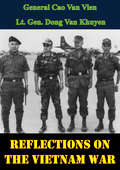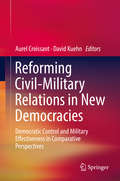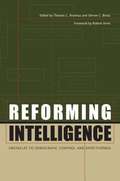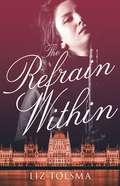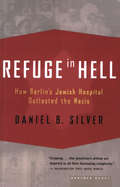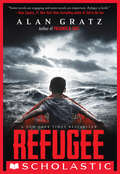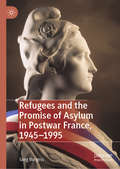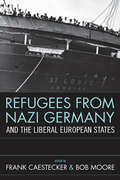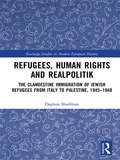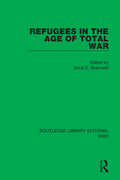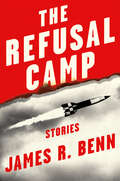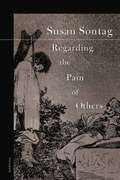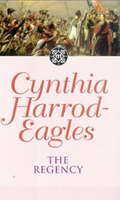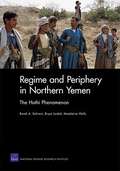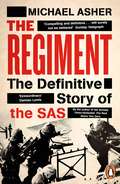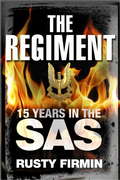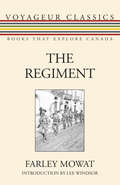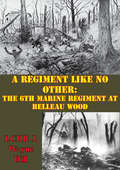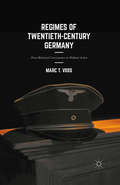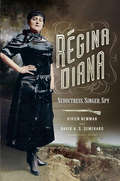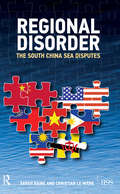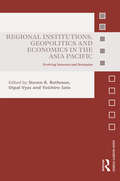- Table View
- List View
Reflections On The Vietnam War (Indochina Monographs #7)
by General Cao Van Vien Lt. Gen. Dong Van KhuyenThis monograph forms part of the Indochina Monograph series written by senior military personnel from the former Army of the Republic of Vietnam who served against the northern communist invasion."The Vietnam War was an unusual and complex experience. Directed and sustained by Communist North Vietnam under the label of national liberation, it combined the elements of insurgency and conventional warfare. It began with guerrilla tactics but developed into and concluded with open invasion. Basically, however, it remained an ideological conflict whose ultimate outcome depended on popular participation and support.The requirements to fight this war were multiple and challenging. Counterinsurgency demanded that we mobilize our resources to strengthen the regime, protect the people and obtain their allegiance, root out the enemy infrastructure, and extend our armed forces to maintain security over the national territory. All this had to be done in the midst of mounting political dissent and social divisiveness. To meet the threat of large-scale conventional attacks, we had to contend with enemy sanctuaries in neighboring countries, the inhospitable terrain of our extensive borders, and uninterrupted infiltration. However, our efforts were greatly restrained by limited forces and prevailing policies.To analyze critically the chain of events which shaped the final outcome of the war in order to learn from our failures and successes, we have drawn primarily on our first-hand knowledge of major events and our personal involvement in the conduct of war efforts. We hope that in addressing the Salient points raised in all previous monographs of this series with fresh insights, our work will be able to provide a critical, comprehensive view of the war experience on the South Vietnam side."-Author's Preface.
Reform in the Royal Navy: A Social History of the Lower Deck, 1850 to 1880
by Eugene L. RasorThis book details the transition of the Royal Navy of Great Britain from the old sailing traditions of St. Vincent and Nelson to the age of steam, ironclads and progressive society.
Reforming Civil-Military Relations in New Democracies
by Aurel Croissant David KuehnThis book addresses the challenge of reforming defense and military policy-making in newly democratized nations. By tracing the development of civil-military relations in various new democracies from a comparative perspective, it links two bodies of scholarship that thus far have remained largely separate: the study of emerging (or failed) civilian control over armed forces on the one h∧ and work on the roots and causes of military effectiveness to guarantee the protection and security of citizens on the other. The empirical and theoretical findings presented here will appeal to scholars of civil-military relations, democratization and security issues, as well as to defense policy-makers.
Reforming Intelligence
by Thomas C. BruneauThese days, it's rare to pick up a newspaper and not see a story related to intelligence. From the investigations of the 9/11 commission, to accusations of illegal wiretapping, to debates on whether it's acceptable to torture prisoners for information, intelligence-both accurate and not-is driving domestic and foreign policy. And yet, in part because of its inherently secretive nature, intelligence has received very little scholarly study. Into this void comes Reforming Intelligence, a timely collection of case studies written by intelligence experts, and sponsored by the Center for Civil-Military Relations (CCMR) at the US Naval Postgraduate School, that collectively outline the best practices for intelligence services in the United States and other democratic states. Reforming Intelligence suggests that intelligence is best conceptualized as a subfield of civil-military relations, and is best compared through institutions. The authors examine intelligence practices in the United States, United Kingdom, and France, as well as such developing democracies as Brazil, Taiwan, Argentina, and Russia. While there is much more data related to established democracies, there are lessons to be learned from states that have created (or re-created) intelligence institutions in the contemporary political climate. In the end, reading about the successes of Brazil and Taiwan, the failures of Argentina and Russia, and the ongoing reforms in the United States yields a handful of hard truths. In the murky world of intelligence, that's an unqualified achievement.
The Refrain Within (Music of Hope #3)
by Liz TolsmaTo save a life, would you betray everyone you love?Hungary in 1944 is a dark place. The Nazis have invaded and turned the country upside down, their evil making its way into every life.Clarinetist Eva Bognar is engaged to conductor and composer Patrik Kedves, happily planning her wedding. At first she doesn’t think the war will affect her directly; everyone around her can be trusted to do the right thing. Then her Jewish best friend and sister-in-law Zofia goes missing--and instead of the Gestapo being to blame, a friend says it was Patrik who led Zofia away. Has he betrayed Eva and everything the family stands for?When the rest of the family’s lives are directly threatened, Patrik’s secrets must come to light. The Bognars flee for the border in hopes of getting out of the country to the safety of Palestine. Eva must put her life and the lives of everyone she loves in the hands of the very man who betrayed her--and they may not all make it out of the war alive . . .
Refuge (Outlanders #36)
by Victor Milan James AxlerThe war to free post-apocalyptic Earth from the grasp of its oppressors slips into uncharted territory as the fully restored race of the former ruling barons are reborn to fearsome power. Facing a virulent phase of a dangerous conflict, and galvanized by forces they have yet to fully understand, the Cerberus rebels prepare to battle an unfathomable enemy, as the shifting sands of world domination continue to chart their uncertain destiny... DEADLY SANCTUARY As their stronghold becomes vulnerable to attack, an exploratory expedition to an alternate Earth puts Kane and his companions in a strange place of charming Victoriana and dark violence. Here, the laws of physics have been transmuted and a global alliance against otherworldly invaders has collapsed. Kane, Brigid, Grant and Domi are separated and tossed into the alienated factions of a deceptively deadly world-one from which there may be no return. Some violence.
Refuge in Hell: How Berlin's Jewish Hospital Outlasted the Nazis
by Daniel B. Silver“Fascinating footnote to Holocaust history . . . a Jewish hospital in the heart of Berlin that treated patients to the very end of Hitler’s reign” (Kirkus Reviews, starred review)“One of the most incredible stories of World War II.” —Dallas Morning NewsHow did Berlin’s Jewish Hospital, in the middle of the Nazi capital, survive as an institution where Jewish doctors and nurses cared for Jewish patients throughout World War II? How could it happen that when Soviet troops liberated the hospital in April 1945, they found some eight hundred Jews still on the premises? Daniel Silver carefully uncovers the often surprising answers to these questions and, through the skillful use of primary source materials and the vivid voices of survivors, reveals the underlying complexities of human conscience.The story centers on the intricate machinations of the hospital’s director, Herr Dr. Lustig, a German-born Jew whose life-and-death power over medical staff and patients and finely honed relationship with his own boss, the infamous Adolf Eichmann, provide vital pieces to the puzzle—some have said the miracle—of the hospital’s survival. Silver illuminates how the tortured shifts in Nazi policy toward intermarriage and so-called racial segregation provided a further, if hugely counterintuitive, shelter from the storm for the hospital’s resident Jews. Scenes of daily life in the hospital paint an often heroic and always provocative picture of triage at its most chillingly existential. Not since Schindler’s List have we had such a haunting story of the costs and mysteries of individual survival in the midst of a human-created hell.“Gripping . . . one physician’s actions are depicted in all their fascinating complexity.” —The Washington Post Book World
Refugee
by Alan GratzJOSEF is a Jewish boy living in 1930s Nazi Germany. With the threat of concentration camps looming, he and his family board a ship bound for the other side of the world . . . ISABEL is a Cuban girl in 1994. With riots and unrest plaguing her country, she and her family set out on a raft, hoping to find safety in America . . . MAHMOUD is a Syrian boy in 2015. With his homeland torn apart by violence and destruction, he and his family begin a long trek toward Europe . . . All three kids go on harrowing journeys in search of refuge. All will face unimaginable dangers -- from drownings to bombings to betrayals. But there is always the hope of tomorrow. And although Josef, Isabel, and Mahmoud are separated by continents and decades, shocking connections will tie their stories together in the end. Alan Gratz delivers an action-packed novel that tackles topics both timely and timeless: courage, survival, and the quest for home. A New York Times Bestseller
Refugees and the Promise of Asylum in Postwar France, 1945–1995
by Greg BurgessThis book recounts France’s responses to refugees from the liberation of Paris in 1944 to the end of the civil wars in the former Yugoslavia in 1995. It questions whether France fulfilled the promise of asylum for those persecuted for the ‘cause of liberty’ made in its Constitution of 1946. Post-war development and the demand for immigrant workers were favourable to refugees from the Communist east, from Franco’s Spain, from Hungary after insurrection of 1956, and later from Latin America and Indochina. Asylum developed nationally in conjunction with international developments, the interventions of the United Nations High Commissioner for Refugees, and the adoption of the 1951 Refugee Convention. Economic ruptures in the 1970s, however, and the appearance of refugees from Asia and Africa, led to the assertion of national priorities and brought about a sense of crisis, and questions about whether France could continue to fulfil its promise.
Refugees From Nazi Germany and the Liberal European States
by Frank Caestecker Bob MooreThe exodus of refugees from Nazi Germany in the 1930s has received far more attention from historians, social scientists, and demographers than many other migrations and persecutions in Europe. However, as a result of the overwhelming attention that has been given to the Holocaust within the historiography of Europe and the Second World War, the issues surrounding the flight of people from Nazi Germany prior to 1939 have been seen as Vorgeschichte (pre-history), implicating the Western European democracies and the United States as bystanders only in the impending tragedy. Based on a comparative analysis of national case studies, this volume deals with the challenges that the pre-1939 movement of refugees from Germany and Austria posed to the immigration controls in the countries of interwar Europe. Although Europe takes center-stage, this volume also looks beyond, to the Middle East, Asia and America. This global perspective outlines the constraints under which European policy makers (and the refugees) had to make decisions. By also considering the social implications of policies that became increasingly protectionist and nationalistic, and bringing into focus the similarities and differences between European liberal states in admitting the refugees, it offers an important contribution to the wider field of research on political and administrative practices.
Refugees, Human Rights and Realpolitik: The Clandestine Immigration of Jewish Refugees from Italy to Palestine, 1945-1948 (Routledge Studies in Modern European History)
by Daphna SharfmanThis book presents a multidimensional case study of international human rights in the immediate post-Second World War period, and the way in which complex refugee problems created by the war were often in direct competition with strategic interests and national sovereignty. The case study is the clandestine immigration of Jewish refugees from Italy to Palestine in 1945–1948, which was part of a British–Zionist conflict over Palestine, involving strategic and humanitarian attitudes. The result was a clear subjection of human rights considerations to strategic and political interests.
Refugees in the Age of Total War (Routledge Library Editions: WW2 #26)
by Anna C. BramwellThis book, first published in 1988, charts society’s responses to the huge numbers of refugees in Europe and the Middle East during and after the Second World War. At the close of the war large areas of Europe lay in ruins, and large numbers of refugees faced upheaval and famine. Political considerations influenced the decisions as to who received assistance, and refugees were forcibly repatriated or resettled – and in the analysis of these matters and more, both the refugee crises of the 1940s and their relevance today are highlighted.
The Refusal Camp: Stories
by James R. BennThese dazzling stories show a crime fiction veteran at the height of his career.In his first-ever collection, the award-winning author of the Billy Boyle World War II mysteries presents an eclectic mix of new and previously published mystery stories rife with historical detail and riveting wartime storytelling.&“The Horse Chestnut Tree&” explores betrayal and murder during the American Revolution. In the speculative work &“Glass,&” an atomic supercollider and the breakdown of the time-space continuum change the lives of two cousins devoured by greed. &“Vengeance Weapon,&” a historical thriller about an enslaved Jewish laborer working at the Dora concentration camp, looks at how far someone will go to get revenge. And for his Billy Boyle fans, Benn delivers &“Irish Tommy,&” a police procedural set in 1944 Boston featuring Billy&’s father and uncle.Full of terror, action, amusement, and bliss, The Refusal Camp is a must-have collection from a crime fiction veteran at the height of his career.
Regarding the Pain of Others
by Susan SontagHow does the spectacle of the sufferings of others (via television or newsprint) affect us? Are viewers inured--or incited--to violence by the depiction of cruelty? In Regarding the Pain of Others, Susan Sontag takes a fresh look at the representation of atrocity-from Goya's The Disasters of War to photographs of the American Civil War, lynchings of blacks in the South, and the Nazi death camps, to contemporary horrific images of Bosnia, Sierra Leone, Rwanda, Israel and Palestine, and New York City on September 11, 2001. In Regarding the Pain of Others Susan Sontag once again changes the way we think about the uses and meanings of images in our world, and offers an important reflection about how war itself is waged (and understood) in our time.
The Regency: The Morland Dynasty, Book 13 (Morland Dynasty #13)
by Cynthia Harrod-Eagles1807: the Napoleonic Wars continue and their violence reverberates in the lives of the Morland family.Lucy trying to rebuild her life after the death of her lover, Captain Weston, is thrown into doubt and confusion by an unexpected proposal of marriage. At Morland Place, the hard-won happiness of James and Heloise is threatened by his rebellious daughter, Fanny. As heiress to the Morland estate, Fanny is determined to claim more than her inheritance, but for those dependent on her generosity, Fanny's decision to marry the unscrupulous Lieutenant Hawker brings only anxiety.These troubled times hold many surprises, and in their darkest hour the Morlands make an astonishing discovery which enables them to face the uncertain future with new strength.
The Regency: The Morland Dynasty, Book 13 (Morland Dynasty #13)
by Cynthia Harrod-Eagles1807: the Napoleonic Wars continue and their violence reverberates in the lives of the Morland family.Lucy trying to rebuild her life after the death of her lover, Captain Weston, is thrown into doubt and confusion by an unexpected proposal of marriage. At Morland Place, the hard-won happiness of James and Heloise is threatened by his rebellious daughter, Fanny. As heiress to the Morland estate, Fanny is determined to claim more than her inheritance, but for those dependent on her generosity, Fanny's decision to marry the unscrupulous Lieutenant Hawker brings only anxiety.These troubled times hold many surprises, and in their darkest hour the Morlands make an astonishing discovery which enables them to face the uncertain future with new strength.
Regime and Periphery in Northern Yemen: The Huthi Phenomenon
by Barak A. Salmoni Madeleine Wells Bryce LoidoltFor nearly six years, the government of Yemen has conducted military operations north of the capital against groups of its citizens known as "Huthis." In spite of using all means at its disposal, the government has been unable to subdue the Huthi movement. This book presents an in-depth look at the conflict in all its aspects. The authors detail the various stages of the conflict and map out its possible future trajectories.
The Regiment: The Definitive Story of the SAS
by Michael AsherFrom the bestselling author of The Real Bravo Two Zero comes the definitive history of the world's most elite fighting force - the SAS'Breathtaking bravery, astonishing feats of endurance, raids and battles described with terrific immediacy and pace. Compelling and definitive . . . will surely not be bettered' Sunday TelegraphOn 4 May 1980, seven terrorists holding twenty-one people captive in the Iranian Embassy in London's Prince's Gate, executed their first hostage. They threatened to kill another hostage every thirty minutes until their demands were met. Minutes later, armed men in black overalls and balaclavas shimmied down the roof on ropes and burst in through windows and doors. In seconds all but one of the terrorists had been shot dead, the other captured.For most people, this was their first acquaintance with a unit that was soon to become the ideal of modern military excellence - the Special Air Service regiment. Few realized that the SAS had been in existence for almost forty years, playing a discreet, if not secret, role almost everywhere Britain had fought since World War II, and had been the prototype of all modern special forces units throughout the world.In The Regiment, Michael Asher - a former soldier in 23 SAS Regiment - examines the evolution of the special forces idea and investigates the real story behind the greatest military legend of the late twentieth century.'Detailed, scathingly honest. Asher has brought the critical eye of the knowledgeable insider to his in-depth study of SAS operations and personalities' HeraldPraise for Michael Asher: 'This is the most complete picture of the Sudanese campaigns that has yet been published . . . a vigorous and engrossing narrative' Philip Ziegler, Daily Telegraph'A staggering achievement. Asher has delivered a scintillating tale of a period of history that deserves to be remembered' Guardian
The Regiment: 15 Years in the SAS
by Rusty FirminThis is the unforgettable chronicle of Rusty's combat experiences, transporting the reader back to the cutting edge of the SAS's deadly covert missions during the crises of the 80s and 90s. But even more fascinating is his intimate portrayal of what the service was actually like to live and work in. Having served as a paramedic, a demolitions expert, a linguist and ultimately the senior SAS bodyguard instructor, Rusty draws on a unique breadth of experience to delve into the hidden world of the SAS as an institution.From its early beginnings in World War II, the Special Air Service (SAS) has won renown in some of the most dramatic, dangerous and controversial military special operations of the 20th century. It is a secretive and mysterious unit, whose operations and internal structures are hidden from the public eye. Now, one of its longest-serving veterans offers a glimpse into the shadowy world of the SAS. Rusty Firmin spent an incredible 15 years with 'The Regiment' and was a key figure in the assault on the Iranian Embassy in London in May 1980, the near-suicidal planned attack on Argentina (operation MIKADO) during the Falklands war and the secret conflict between the SAS and the IRA in the 80s.
The Regiment
by Farley Mowat Lee WindsorThe story of an astonishing band of Canadian soldiers and their part in the Allied victory in Italy. The Hastings and Prince Edward Regiment (the Hasty Ps) was Canada’s most decorated regiment in the Second World War, winning thirty-one battle honours. Famed for their role in the Allied invasion of Sicily and the conquest of Italy, for six years the members of the regiment suffered brutal conditions, fighting bravely in the face of fierce opposition from the enemy, and ultimately triumphing. In The Regiment (originally published in 1955), Farley Mowat, famed Canadian fiction writer and regiment member, tells the story of the Hasty Ps, from their recruitment in September 1939 until the end of the war. Mowat was a second lieutenant and platoon leader with the regiment, and writes movingly of the great suffering his fellow soldiers endured, their bravery in battle, and the lasting friendships he forged as a member of the group.
A Regiment Like No Other: The 6th Marine Regiment At Belleau Wood
by LCDR J. Wayne HillThis thesis addresses the unique composition of the 6th U.S. Marine Regiment and the role they played in the battle of Belleau Wood. It analyzes composition of the 6th Marine Regiment: 60 percent were college men, many of whom were college athletes. With the exception of the Battalion's senior officers and a handful of senior non-commissioned officers, the Regiment was composed of volunteers. Although they were put through rigorous training, these young Marines were not fully prepared for the war that they would face. These young men overcame shortfalls, and became leaders who motivated others to follow. The argument is that these men were able to use their educational and athletic backgrounds to overcome adverse training and combat conditions and proceeded to shape both the outcome of the First World War as well as the Marine Corps for the remainder of the 20th Century.
Regimes of Twentieth-Century Germany: From Historical Consciousness to Political Action
by Marc T. VossRegimes of Twentieth-Century Germany is a concise theory of and empirical study on action consciousness as an integral dimension of historical consciousness with specific emphasis on National Socialist Germany and the German Democratic Republic.
Regina Diana: Seductress, Singer, Spy
by Vivien Newman David A. SemeraroThe Untold Story of Rgina Diana tells of the rebellious daughter of working-class French-Italian parents from a run-down area of Geneva who, trained by the most ruthless spymaster of them all, Elisabeth Schragmller (aka Fraulein Doktor), became a much-adored French caf-concert singer, a discreet and highly prized prostitute plying her trade, and a successful German Great War spy.Reginas spy operations were full of intrigue: a network spanning four countries based in the shamed city of Marseille, with her performing abilities and sexual charms allowing her to lure men from privates to generals into giving her vital information.This book is not just about Rgina, but also explodes the much-vaunted myth of Swiss neutrality. Switzerland, a nest of spies, was riven between support for Germany and France; in an extraordinary penetration of the upper echelons of Swiss society, the Swiss Army Commander-in-Chief was married to former German Chancellor Otto von Bismarks daughter.Yet exhuming Rgina from her unmarked grave involved a tantalizing journey - getting past her disavowal by both France and Switzerland, unraveling the truth behind a three-line report about a pretty Swiss singers execution and overcoming the obfuscation of French military archivists. Even her execution was fittingly exceptional. So determined were the French authorities that she should die, her firing squad numbered not the usual twelve, but twenty-five smoking rifles.
Regional Disorder: The South China Sea Disputes (Adelphi series)
by Sarah RaineChina‘s rise casts a vast and uncertain shadow over the regional balance of power in the Asia Pacific, and nowhere is this clearer than in the South China Sea. The significance of the fraught territorial disputes in this potentially resource-rich sea extends far beyond the small groupings of islands that are at their heart, and into the world of great-power politics. As the struggle for hegemony between the US and China intersects with the overlapping aspirations of emerging, smaller nations, the risk of escalation to regional conflict is real. Christian Le Mi and Sarah Raine cut through the complexities of these disputes with a clear-sighted, and much-needed, analysis of the assorted strategies deployed in support of the multiple and competing claims in the SCS. They make a compelling case that the course of these disputes will determine whether the regional order in Southeast Asia is one of cooperation, or one of competition and even conflict.
Regional Institutions, Geopolitics and Economics in the Asia-Pacific: Evolving Interests and Strategies (Asian Security Studies)
by Steven B. Rothman Utpal Vyas Yoichiro SatoThis volume discusses the relationship between economics, geopolitics and regional institutional growth and development in the Asia-Pacific region. How do states (re)define their relationships amid the current global power transition? How do rival actors influence the rules and formation of new institutions for their own benefit? What role will institutions take as independent actors in influencing and constraining the behavior of states? Institutional development in Asia is characterized by idiosyncratic and diverse motivations (both material and non-material), a variety of policy strategies (strategic and norm-based), and the looming question of China’s future depth of involvement as its economic position becomes more stable and its confidence in foreign affairs grows. The book reflects the broadening definition of Asia by examining multiple perspectives, including Japan, China, South Korea, the United States, Australia, India, Russia, and Taiwan. In addition to state actors, the contributors address several important regional institutions in development such as the ASEAN (+3, +6, and the East Asian Summit), the Asian Infrastructure Investment Bank (AIIB), the Asian Development Bank (ADB), existing security alliances, and other bilateral institutions. Ultimately, this volume describes the unique, slow, and diverse growth of a multitude of regional institutions, the complexities of generating cooperation, membership concerns, and competition between states and with existing institutions in the context of China’s increasing confidence and strength. This book will be of much interest to students of Asian politics, regional security, international organizations, and foreign policy.
